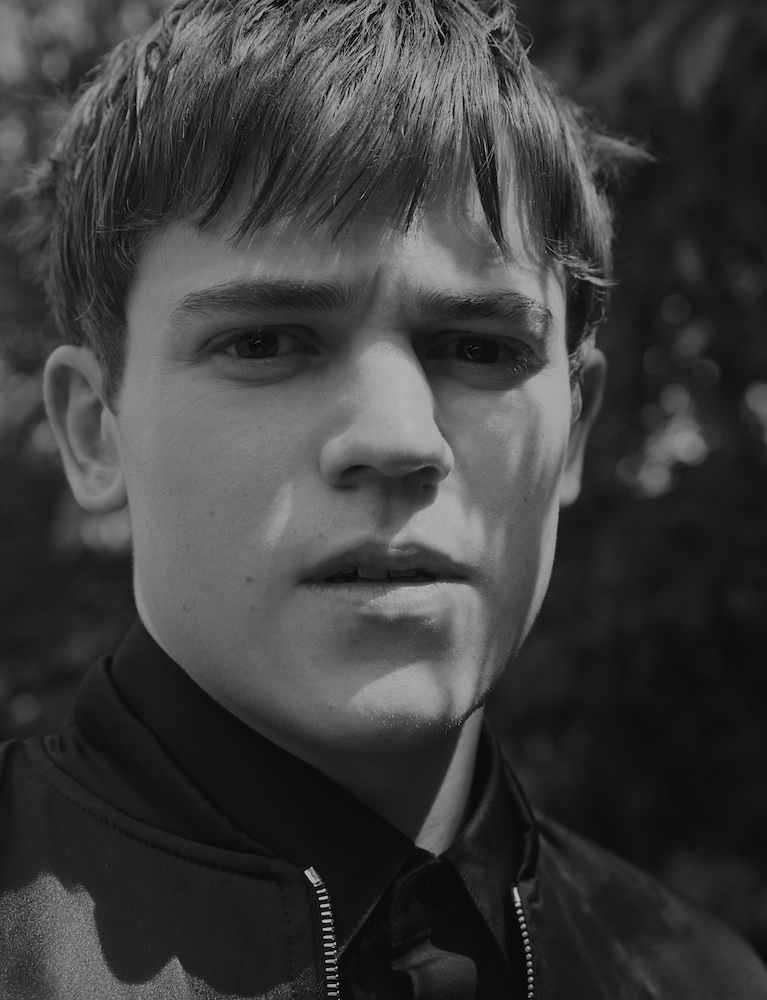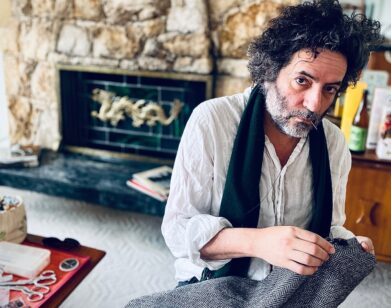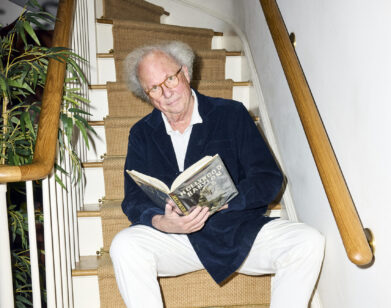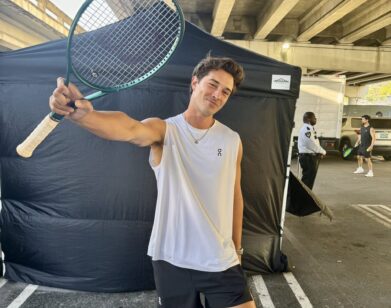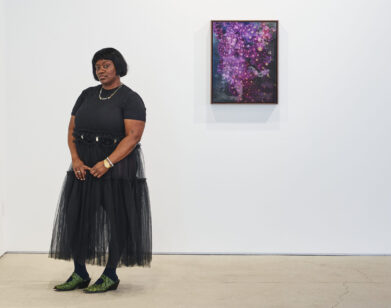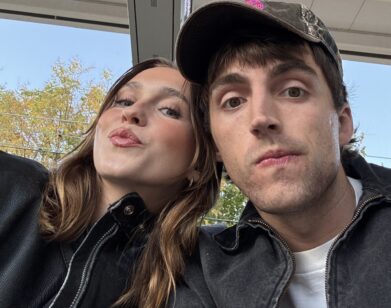Discovery: Sam Clemmett
ABOVE: SAM CLEMMETT IN LONDON, JULY 2016. PHOTOS: LIAM WARWICK. STYLING: SANTI RODRIGUEZ. HAIR: DAVID HARBOROW. MAKEUP: THOM WALKER. PROP STYLING: TARA HOLMES.
When Sam Clemmett signed on to play Albus Potter, Harry Potter’s youngest son, in Harry Potter and the Cursed Child, he was aware of the risks. “I read the script and went, ‘This is excellent.’ Jack Thorne is a genius when it comes to writing anything about teenage angst, love, grief, fathers and sons,” he explains at a café in London. “But you never really know… It is one of the biggest literary and entertainment franchises in the whole world.”
Conceived of by playwright Jack Thorne, director John Tiffany, and J.K. Rowling, and currently running at the Palace Theatre in London’s West End, The Cursed Child begins with the very last chapter of Harry Potter and the Deathly Hallows. Nineteen years after finally vanquishing He Who Must Not Be Named and saving the wizarding world, Harry (Jamie Parker) is back at Platform 9 ¾ helping his two sons James and Albus Severus board the Hogwarts Express. Ginny Weasley (Poppy Miller)—now Ginny Potter—is by his side with their young daughter Lily. Ron (Paul Thornley) and Hermione (Noma Dumezweni) are there to see off their daughter Rose Granger-Weasley (Cherrelle Skeete). Even Draco Malfoy (Alex Price) is there with his only child Scorpius (Anthony Boyle). About to enter his first year, Albus is extremely nervous. He asks his father, “What if I’m put in Slytherin?”
Until you see the play, which is split into two parts, each around two hours and 40 minutes, it’s difficult to envision how the magic of Harry’s world could translate to the stage. But the choreography and stunts—the polyjuice potion, talking portraits, swiveling staircases, spells, and reappearance of Hogwarts favorites—are seamless and mesmerizing. The experience of seeing them live alongside a devoted audience makes them perhaps more magical than in the films. “The audience is so engaged and so focused,” notes Clemmett. “In a lot of the really intimate and quiet scenes, between Harry and Albus, Scorpius and Draco, Scorpius and Albus, you can hear a pin drop,” he continues. “You do feel there’s an energy behind and there’s a love from them for these characters and these stories.”
Although onstage Clemmett plays Albus from the ages of 11 to 14, in real life the Norfolk native is 22. The middle of three children, Clemmett made his professional debut in Lord of the Flies at Regents Park’s Open Air Theater five years ago, a role he won without an agent. Since then, he has appeared in the 1950s drama Accolade at the Saint James Theatre and the Royal Shakespeare Company’s production of Wendy and Peter Pan, among other productions.
When we meet in person, Clemmett is polite and engaged, and seems to lack any of the vanity you might expect from a young actor in a blockbuster production. Though nothing has been officially confirmed, it seems inevitable that The Cursed Child will make it to Broadway and beyond.
AGE: 22
HOMETOWN: Norwich, Norfolk, England
FAMILY BACKGROUND: My mum was a ballet dancer when she was young. She wanted to go in to acting, but that didn’t come to fruition—she didn’t really follow that path. My brother works in a pub; my dad is a sales director for a company in the Midlands. My mum’s a secretary for pharma solicitors.
INTRODUCTION TO ACTING: It all came about when I was 10 and was part of this arts course in Norwich. I did it as a hobby more than anything, because I was quite shy when I was a kid. That brought me out of my shell and people said, “You should look at doing National Youth Theatre, because it’s a great way in. It’s your first taste of professional work and they get a lot of practitioners in to do workshops with you.” I did the audition, got a place, and did the two week course. That was the first time I was working with all these different people in the industry, looking at doing physical theater, music, singing, improvisation—tons and tons of stuff.
FIRST PROFESSIONAL AUDITION: As part of National Youth Theatre there’s this members’ area where they put up professional jobs, and this job came up for Lord of The Flies at Regent’s Park Open Air Theatre. I had three or four auditions and was then lucky enough to be one of the ten young lads that got cast. Lord of the Flies was my first audition. I was completely out of my depth. I remember all these drama school grads that were about to go audition—they were doing their vocal warm-ups and I was sitting there with my dad saying, “I don’t know what the hell I’m doing.” I went in and met Piper and Tim and I did the speech. I remember him going, “Oh, that was terribly good. Let’s try this,” and we tried it a different way. He sat me down and said, “You’re from Norwich?” and we talked about me being very young, because I was the youngest in the cast. I was 17, but a very young 17-year-old. Growing up in Norfolk, it’s a very sheltered life. And he was just talking that way—if I had to live down here, would I be comfortable doing it? I suppose in his mind he just wanted to make sure I was looked after. Then I got invited back, met with the group of people, did the workshop, and got one of the parts. It was bonkers. Even in the rehearsal process I was completely out of my depth. I didn’t know what the process was; when it came down to doing text work, I didn’t really know how to break down a text. It was a mad experience, but a lot of fun when you don’t really know what you’re doing. You don’t care.
AN EARLY DRY SPELL: There was a moment when I had done Lord of The Flies, and this is my naïveté talking, but I thought, “I’ve just been one of the young ten lads in one of the new big shows in London surely something else will land pretty quickly,” and it didn’t. I was out of work for about eight, nine months. Yes, it was during my A-levels, but it kind of knocked me a bit. I thought, “This isn’t what I thought it was going to be. I thought it was going to be a lot easier than this.” But instead of going, “I’m going pack this in,” I thought, “I’ll go audition for drama schools.” I auditioned for a small handful just to give that scene a go and see what that vibe was. I was on the waiting list, and I thought that surely in the second year they’d offer me a place, but they never did. That was when I said to my agent, “I don’t know if this is going to work.” Then all of the sudden work started happening, and I got my first TV job. I started going in for a lot more different things. I think everyone does go through that stage about whether or not they’re cut out to do this. Actors have got a lot of insecurities and are very self-conscious, but I did have a small blip at one point towards the beginning, absolutely.
A SECOND PLAY: [With Accolade,] I felt more like I had earned a place to be there. I felt like I was part of that group of people in the room instead of being an outsider. I could have these conversations and dialogues about the characters and the text itself. I definitely had more confidence. I think having finished my A-levels and then being 18—that whole year I grew up an awful lot. It was more fun because I felt comfortable. It was a very different play as well; there was no physical theater or anything like that, which I had done a lot of in the past. It was very much the text: sitting around a table discussing the play, the characters, the themes, and then getting up and having it play that way.
THE POTTER PROCESS: Everything is so different. It depends on the play. If you’re doing a straight play like Accolade was, the first day you do a read through, there’s a model box showing, and then you sit around a table and discuss the first scene or the first 10 pages and the characters and talk about backstory and all that. With Harry Potter, we threw ourselves in the first day, without doing a read through—we did that at the end of the first week. We had the model box showing, we did a bit of a meet and greet, played a bit of a name game to try to get everyone’s names in our head because it’s such a big company. And then we threw ourselves into one of the first scenes of the play where everyone’s involved and we see Albus go through his first four years of Hogwarts, and that’s a very physical part of the show. We just started retelling that story, the magic of that, the physicality of that. It was less sitting around a table and discussing things [and more] get up and play, which was lovely and I think broke the ice with everyone. Eventually the text work started coming. I like the fact that every process is different and it’s not kind of a routine job. You never know how a new director works; everyone is very different in their approaches.
THE DRESS REHEARSAL: The thing with our dress rehearsals is they had audiences, we had invited an audience of friends and family. I suppose that was less of a bad thing because they’re all going to be very supportive. The first dress rehearsal we had two hundred and then we had 700 and then the first preview happened. Dress rehearsals usually are, “Okay, if it’s going to go wrong, let it go wrong here.” But the fact that we’re sort of thrown into an audience, you kind of go, “This is going to happen and it’s going to be good.” You throw yourself into it and don’t think about it, and then all of the sudden you’re in the whirlwind and you’re riding it. We had such a long rehearsal process as well, we had 10 weeks rehearsal and then tech, and then we had the dress rehearsals. A normal rehearsal process is three or four weeks, and all of the sudden it’s like, “Shit! We’re here, let’s do it.” I suppose we did feel a bit more comfortable with this one.
THE PREVIEW: Was like a rock concert. I’ve never been part of a theatrical event like it in my life. The audience members were extraordinary; they were totally with the story, picking up on every single beat and all the Harry Potter knowledge that was there. The moment that we talked about the death of Harry’s parents—the 31st of October—there’s this huge gasp, and to be in a room where there are audible gasps, it’s really extraordinary. Then the reviews came out and that kind of finalized that it was a hit. When I first got the job I was ecstatic. Then I got off the phone with my agent and had this sinking feeling like, “Shit, oh my god.” Because you’re taking this story forward with the new generation and all of these new characters—you’ve got to hope people fall in love with them as much as they fell in love with Harry, Ron, and Hermione.
POLYJUICE POTIONS: As soon as you hear the word “Polyjuice” the audience is going, “Come on, then. How are you going to do it?” I won’t explain how Steven Hoggett did it all, but we had all this stuff in the rehearsal room to start working on and it took forever to get right, to master. Now it’s second nature, but it is very technical. It looks brilliant. I’ve seen a lot of the understudies do it and it’s hilarious. I think [the entrance to the Ministry of Magic] is everyone’s favorite. That and the first trick of the show, where we change from our jackets into the cloaks. I think it’s such a clever trick. It’s right at the beginning in the first 30 seconds and you instantly go, “Okay this is Harry Potter. We’re doing Harry Potter. This is going to be good.”
RELATING TO ALBUS: When I first read it, I didn’t like Albus at all. I think he’s very tricky to like as a character, and I instantly wanted to find a version of him where he’s not just an angsty teenager—there is something more to him than that. So I started talking to [the director] John about the backstory and how much of the Hogwarts world has he been allowed to see into, because obviously he’s got the burden of his father’s past and they don’t get on. I always tried to find the similarities and the differences. He’s very misunderstood young lad who’s bullied at school, and I went through a stage of bullying, so for me, the starting point was looking at the bullying and how that affected him and shaped him as a person, and how that then affected his relationship with his father. Moving on from then, the friendship he has with Scorpius. A big thing about the play is the power of friendship, and that’s one of the main themes throughout this whole story. They were my main starting points. Then, as we went through, physically trying to find him: how he walks, how he stands, how he talks. It is weird, as soon as you put the shoes on of the character for the first time, you kind of go, “Oh, this is what it feels like.”
KEEPING THINGS FRESH: I remember a teacher of mine from back home in Norwich, and I’ve heard it several times as well, just go, “If you feel yourself fall into a pattern, and you start doubting yourself about a line, just trip yourself up in the scene. Force yourself to trip yourself up and see where it goes.” And it’s so true. As soon as you start tripping yourself up, you find new things, and it’s not like your intention in the scene changes, because the scene is what it is, you have to keep the scene as it is and that’s the story we’re telling, but you can just play it a slightly different way, and I think that’s such an important bit of advice. It makes it more fun as well. I do think it’s easy in these long runs to clock-in and clock-out, and you’re not fulfilling your artistic ambitions, so I find it really important.
FUTURE PLANS: I’ve recently gotten into Peaky Blinders. I’ve only just finished series one—I’m so far behind—but it’s amazing. Whenever somebody asks me, “What would you love to go into next?” I say, “If I could do something like Peaky Blinders, I’m going to grab that with both hands.” It’s the coolest thing. And Cillian Murphy is just brilliant. I’d love to do a bit more film and TV after this. As great as it is being on stage, just to mix it up and do something new. If Peaky Blinders calls, great. [laughs] It’d be nice to do something completely different to Albus. Particularly with something like Harry Potter, the brand becomes Albus Potter, and that’s what I’m known for, which is great, but I’d love people to know me as an actor. To be able to divert away from this would be really nice afterwards, just open a script and go, “Okay, who’s this person. What’s he about? What are his similarities to me? He’s very different to me—why is he very different to me?” And just play again. That’s the dream.
HARRY POTTER AND THE CURSED CHILD PARTS ONE AND TWO ARE CURRENTLY ON AT THE PALACE THEATRE IN LONDON. FOR MORE INFORMATION, VISIT THE PLAY’S WEBSITE.

